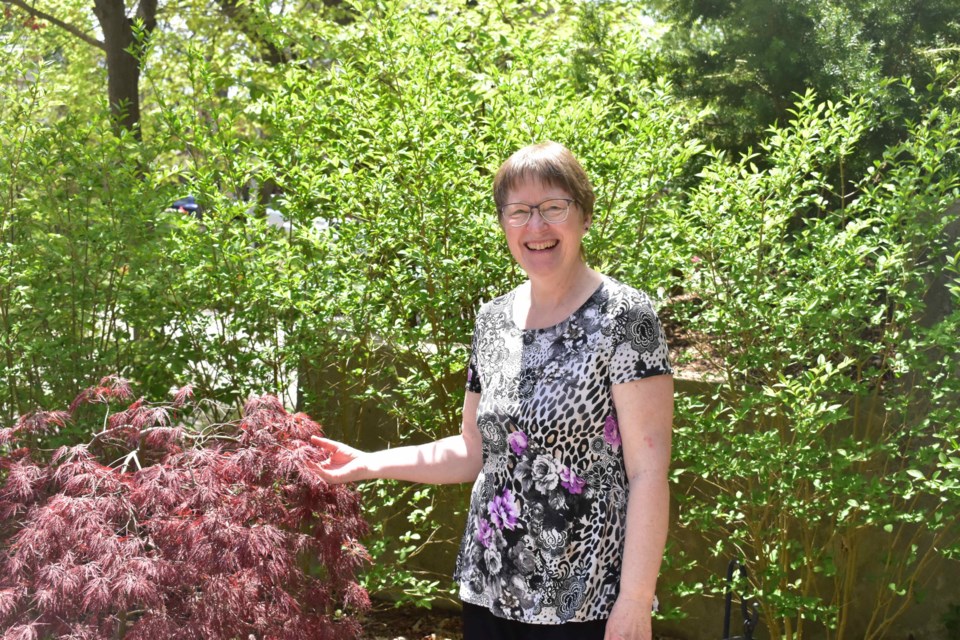A growing number of homeowners in Guelph are embracing their green thumbs by removing their traditional grass lawns and turning towards xeriscaping and permaculture – practices that benefit the environment and provide a haven for pollinating species.
Xeriscaping involves designing landscapes conducive to flora that requires little to no water, thus eliminating the traditional irrigation lawns require, while permaculture creates an urban farm-like system utilizing a diverse range of plants in a symbiotic relationship, cultivating them into a self-sustaining garden.
Embracing these practices with the removal of grass lawns can be a boon for local pollinators while cutting down on the water consumption and pesticide usage a traditional lawn requires.
Clare Irwin, co-chair of Pollination Guelph, has been at the forefront of this movement locally, recognizing that lawns have very little environmental value, replacing her lawn with native species to help pollinators.
“It increases the amount of food available, if you’re planting flower plants, especially traditional native plants, it can be food for the caterpillars or moths, and it adds value for (other) pollinating insects,” said Irwin. “Go for native if possible and that’s getting easier and easier for people to find as there are more growers of native plants locally, pollinators Guelph local plant sales and box stores are selling native plants as well."
And while these are not new practices, Wellington County Beekeepers' Association president Dennis Schmidt said the introduction of wildflowers and diverse vegetation on lawns is helpful to ensuring the survival of local pollinators.
According to Schmidt, forgoing the use of pesticides in these flora rich environments can increase the dependency of pollinators in cities, a factor Schmidt said is important as honey bees, the main pollinating group, are becoming increasingly dependent on cities as agricultural pesticides force bees to look elsewhere for a food source.
With the tribulations of the bee population and their declining status well known, Guelphites are helping prop up colonies with the introduction of native flowering plants.
Guelph resident Tannis Sprott has embraced this notion, converting the entirety of her property into a wildlife and pollinator sanctuary with native shrubs and mulch.
“We needed drought-resistant plants, we wanted things as close to being native Ontario as we could get that would work on this hill, and it’s been really great,” said Sprott. “As with all new garden plans, we’ve lost a few things, but it has been remarkably successful."
Sprott added that she and her husband, Mark McDowell, are not the only ones who enjoy it, as she has seen numerous neighbours stop to admire her garden and smell the flowers in bloom.
“I think if you plant wisely, meaning you give the plan what it wants (in terms of light and moisture) and not try and put it where you want it, the plants that would grow and thrive there look better,” said Sprott.
As for wildlife, Sprott said her and her husband have seen over 87 different bird species that they were able to identify, have seen fawns, chipmunks, squirrels and have provided a habitat to a raccoon family on their property alone.
For those with a lawn, the Nature Conservancy of Canada (NCC) has proposed the springtime chore of mowing the lawn be abandoned for May and residents instead allow wild pollinators and other wildlife to inhabit the greenspaces where we live.
The campaign's goal sets out to give insects and their food suppliers the chance to establish an undisturbed lifecycle while getting the message out about the critical role pollinators play in ensuring the survival of biodiversity.
In a statement, Dan Kraus, NCC’s senior conservation biologist said: "If you imagine dozens and dozens of backyards doing things to improve habitat for native pollinators and migratory birds, this can have a big impact on nature and the quality of our urban ecosystems.”



